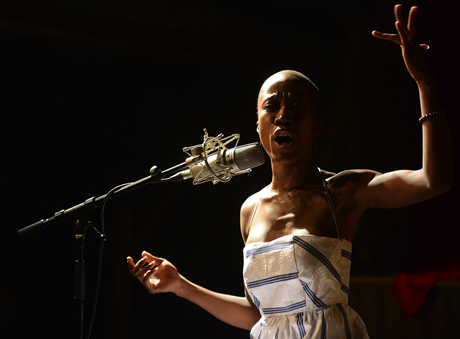Desdemona – an untold story

Rokia Traore performs at Wilton's Music Hall in the first of a series of performances promoted by the Barbican. Photograph: Mark Allan.
A collaborative project involving Shakespeare, avant-garde director Peter Sellars and Nobel prize-winning author Toni Morrison would be a reason for celebration in its own right. Add the angelic tones of Mali’s greatest modern musical export, Rokia Traoré, and it becomes an unmissable landmark in world theatre.
Desdemona, which comes to the Barbican this month as part of the World Shakespeare Festival, focuses on a dialogue between Othello’s wife, the eponymous Desdemona, and her African nurse Barbary, mentioned in passing in the original play.
Morrison, who is renowned for her portrayals of the oppressed and disenfranchised in African-American history, had long wanted to “write a response” to Shakespeare’s canonical tragedy, which is rife with themes of racism and colonialism, and teamed up with Sellars to give the neglected maid a voice from beyond the grave.
The duo approached Traoré to add a musical dimension to the role of Barbary, who is introduced in Shakespeare’s play through the song she taught Desdemona. Traoré inhabits the role of the African maid, and sings her responses to Desdemona in her native Bambara language, a device which has become all the more poignant as the political landscape in the singer’s home country worsens.
Traoré has collaborated with Sellars before and when the American auteur came calling once again, she jumped at the opportunity. “Having Toni Morrison and Peter Sellars as teachers is just something great,” she says. “I didn’t want to disappoint them and I wasn’t sure I’d be able to do such a thing, but I learned so much in these few months.”
“I started working on the music before Toni had even written the script. She articulated her ideas to me so clearly, that when the script actually arrived, there was little difference between what she was saying and what I wrote.
“We worked independently, but there were exchanges between us, and we both changed some things in our work according to the work of the other. Then Peter put together the music and the script. We added things to fit with what he was doing on stage.”
Using Morrison’s conceptions as a starting point was more important to Traoré than adhering to the Shakespearean text. “For me it was just something to create,” she explains. “I wanted to chime with Toni’s script, not with the original Othello.”
Traoré had never read the play before, and had limited exposure to Shakespeare as a youngster. “I grew up in a former French colony. We don’t do English early at school, and Shakespeare isn’t such an important part of our studies.”
Coming to Shakespeare as an outsider helped her connect with the marginalised characters in Othello. “I had a discussion with Toni before reading the original play,” Traoré explains. “She said she wanted to write something about the characters which exist in Othello, but who have no back-story.
“Take Othello himself. He is a black warrior, but there is nothing about his past – we just see Othello as people in Europe would see Africa at this period. And they knew nothing about Africa. Toni gave these characters backgrounds. Her thinking influenced mine.”
Traoré is used to telling stories through her music. In the run-up to Desdemona, she performed three highly acclaimed concerts at venues in east London in which her connection to the traditional African griots, who combine melody and narrative to maintain a vibrant oral history, was eloquently showcased. Her hope, as she has articulated in the past, “is not to show the audience that I know how to sing, but to share something.”
With Desdemona however, Traoré was faced with the challenge of dividing the storytelling between herself, Morrison’s script and the actors on stage. “It was one of the reasons I was anxious before we started this project,” she says. “Sharing the creative space with someone else is different from what I do everyday, but Peter was there to help me through it.”
Desdemona is at the Barbican Hall on Thursday 19 and Friday 20 July.
